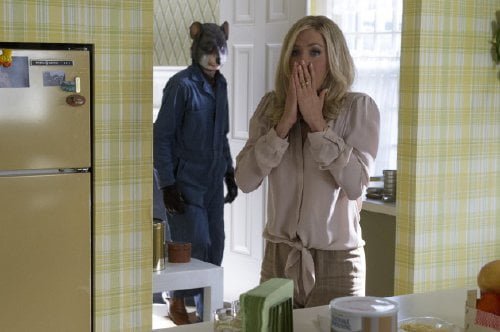Life of Crime

Ordell (Mos Def), Louie (John Hawkes) and Richard (Mark Boone Jr.) have a foolproof plan: kidnap the wife of a corrupt real-estate developer and demand $1000000 in ransom for her safe return. What they do not know, after they snatch Mickey (Jennifer Aniston), is that her husband, Frank (Tim Robbins), has no plans to pay for their “Life of Crime.”
Laura's Review: B
Documentarian Steve James, whose "Hoop Dreams" had been championed multiple times by Gene Siskel and Roger Ebert, was asked to make a documentary based on Ebert's autobiography. Just five months before his death, James began his project, capturing not only Ebert's medical struggles, but his incredible spirit, which did not flag until the day before he died in "Life Itself." More of a companion piece to Ebert's book than a filmed version, James's work begins with two dedications - Chaz's 'A Celebration of Life,' held in a Chicago theater and flash backs to Ebert's Hollywood star ceremony. The filmmaker then jumps in to what he faced on his first day of shooting - Ebert had suffered a fracture during the night which sent him back to the hospital yet again. Much of James's Ebert footage is from rehab or the hospital and twice we witness his feeding process through a tube, tough scenes to take but ones which Ebert emails James about to tell him he's glad he captured something no one's ever seen in a movie. Using old photographs, we learn about his rise as a newspaperman, one whose part time job at the Sun Times turned into the one he'll forever be remembered for when the paper's film critic retired, a case of being in the right place at the right time. We hear about his days of heavy drinking and poor taste in women (until Chaz, that is, who relates here for the first time that the couple met at an AA meeting). A significant amount of time is, of course, devoted to Siskel and Ebert's 'Sneak Previews' and 'At the Movies.' Many have seen the outtakes from these shows where the two needle and snipe at each other relentlessly, but the degree of rancor witnessed here is significant. These two couldn't have been more different, Siskel a Playboy mansion regular who wrote for the more upscale Chicago Tribune, Ebert the blue collar guy who wasn't above squiring around a hooker. But these two did eventually become fast friends and Siskel's wife Marlene, interviewed for the first time, is the film's most eloquent speaker. Also of note is the resistance from New York and L.A. in picking up the Chicago based show. The film is far from a hagiography, noting that Ebert loved the sound of his own voice and could be a bit of a blowhard. His TV show was blasted in Film Comment by Richard Corliss and Chicago Reader critic Jonathan Rosenbaum opines that it favored blockbusters over small films. The latter charge is rebutted, as the duo supported many independent filmmakers and tub thumped for their movies. Another charge - that Ebert befriended many of those he wrote about, a practice frowned upon by many - is countered by Martin Scorsese, a friend who remembers Roger's less than glowing review of "The Color of Money." Chaz, the love of Ebert's life, is shown growing testy when Roger is uncooperative about making his way up some stairs. (She also admits here her anger over his having signed a Do Not Resuscitate form without her knowledge and says that while she would have done anything to continue his battle, that there was extreme peace at the moment of his passing.) James includes a few examples of Ebert reading his own reviews over clips of the movies in question. Then we see how the man who'd literally lost his voice procured a new one via his blog where he wrote about everything under the sun and if there's a weakness in this film it is that we don't hear enough about this fine work. Ebert was a well known raconteur, but those amazing stories are given short shrift. Still, with a two hour running time, James had to cut somewhere.
Robin's Review: B
Writer-director Daniel Schechter adapts Elmore Leonard’s 1978 novel, The Switch, with a fine and funny cast and a screenplay that brings out the author’s eccentric character-driven style. It helps that the characters are peopled by a great gang of veteran actors. Louis has been shadowing Mickey, following her to learn her routine, in preparation of the abduction. He and Ordell think they have all the bases covered when Frank takes an impromptu trip for “business” to Freeport in the Bahamas, dropping his son Bo (Charlie Tahan) off at his grandparents in Florida. This fortuitous trip works perfectly into their plans and the kidnapping takes place without a hitch. Well, there is one hitch: family friend Marshall (Will Forte), knowing Frank is away, drops in for possible tryst with Mickey. The best laid plans, as they say, go terribly awry. The cast does a fine job with Leonard’s usual suspects. Hawkes, Def and Boone are funny as the gang that could not kidnap straight. The relationship between Hawkes’s Louie and Aniston’s Mickey is a miniature form of Helsinki Syndrome and the two bond to a hoped for conclusion. Tim Robbins and Isla Fisher, as his saucy, gold-digging young mistress are great to watch, particularly the conniving Melanie. All involved effortlessly inhabit their characters. The filmmakers do a decent job with the film’s 1978 setting, especially cars, costume and makeup. The score, which uses bongos to good effect, fits the lighter tone of the crimedy. “Life of Crime” is not as stylish or energy-charged as “Get Shorty” and “Out of Sight,” but it is a great deal of fun.

